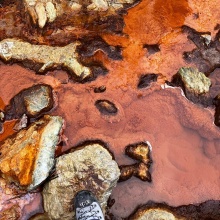Understanding the environmental role of extremophiles in the Rio Tinto (SW Spain) and their implications for astrobiology
In the Rio Tinto, Spain, we investigate extremophiles that thrive in highly acidic and metal-rich environments, exploring their role in heavy metal transport and microbial iron cycling. This research highlights how iron-cycling microorganisms contribute to the mobility of heavy metals, including arsenic and lead, through the formation of suspended particulate matter (SPM) and their interactions with hydrogeochemical gradients. Additionally, the Rio Tinto serves as a natural laboratory for astrobiology; its unique geological and mineralogical characteristics, alongside active carbon, iron, and sulfur biogeochemical cycles, provide insights into potential Martian environments. We study anaerobic microorganisms that utilize various electron donors and acceptors in the Rio Tinto, paralleling conditions believed to have existed on Mars. These findings not only enhance our understanding of impact of microbial processes on heavy metal fate in extreme environments but also suggest hypotheses for future Mars exploration missions.


